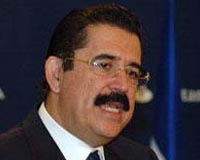| . |  |
. |
La Paz, Bolivia (UPI) Aug 5, 2009 Bolivian President Juan Evo Morales is concerned that recent gains by right-wing political leaders in Argentina and Chile could lead to election wins by fascists and "Pinochetistas" in the two neighboring countries currently ruled by his friends. Morales told a political rally in the capital a right-wing advance in Argentina and Chile in their next elections would be a blow to democracy in Latin America and a serious setback to the continent as a whole, the state-run Agencia Boliviana de Informacion said. "What would happen -- and for that we must be in readiness -- if those aligned with the 'Pinochetistas' win the elections in Chile?" Morales asked, in a reference to the adherents of former dictator Augusto Pinochet, who ruled the country from 1973 to 1990. "It would be very serious for Latin American democracy and for South America." He said that in such an event Bolivia would feel surrounded by an "empire," implying a right-wing bloc of countries that would build up pressure on his own left-wing populist government. Argentina and Chile are currently under governments Bolivia regards as allies. Chile's presidential elections are set for December 2009, and its incumbent President Michelle Bachelet has come under pressure from her ruling coalition's conservative factions led by Eduardo Frei and Sebastian Pinera. Presidential elections in Argentina are not due until 2011, but President Cristina Fernandez de Kirchner lost out to the opposition in the June 28 parliamentary elections. Her Peronist Justicialist Party's representation in the chamber of deputies fell from 115 members to 94 members. In the Senate, the party lost four representatives and was left with 31. The president's husband and former president, Nestor Carlos Kirchner, resigned from the head of the party in the only major acknowledgement of defeat. Fernandez has lost popularity as Argentina's economy has slumped and strengthened her critics with a series of political blunders. She lost a major support base when she tried to raise farm export taxes in 2008, provoking four months of road blockades and protests. Morales himself is seeking re-election in December for another five-year term and has staked his future on increasing "indigenous" representation in Bolivian political life. Critics have said his policies may further divide the country along ethnic and racial lines. Morales, like Hugo Chavez in Venezuela, has also outlined an ambitious plan for economic reform that calls for greater state intervention in all sectors of economic activity. His use of a decree to enforce the reforms has won him few favors with Bolivia's traditional bastions of power, most of them of European or mixed ethnic origin. Morales launched his reforms toward indigenous autonomy this week amid political fanfare in the eastern region of Santa Cruz. He hailed the event as "a historic day for the peasant and indigenous movement." But analysts said the president's plans for multi-tiered autonomy at the departmental, regional, municipal and indigenous levels could be exploited by his foes to trigger chaos in the country. His plans for greater state control on key economic sectors, including Bolivia's vast gas reserves, have already made him enemies in Bolivia's tiny but powerful elite. The analysts view these as more potent challenges to Morales than what may or may not happen in neighboring Argentina and Chile. Share This Article With Planet Earth
Related Links Democracy in the 21st century at TerraDaily.com
 Ousted Honduran leader's supporters vow new protests
Ousted Honduran leader's supporters vow new protestsTegucigalpa (AFP) Aug 3, 2009 Supporters of ousted Honduran President Manuel Zelaya mobilized Monday to prepare new protests calling for his return to power more than a month after the military threw him out of the country. Foreign envoys meanwhile were set to meet Monday with Costa Rican President Oscar Arias, a Nobel peace laureate spearheading an effort to negotiate a deal between Zelaya and the interim government led ... read more |
|
| The content herein, unless otherwise known to be public domain, are Copyright 1995-2009 - SpaceDaily. AFP and UPI Wire Stories are copyright Agence France-Presse and United Press International. ESA Portal Reports are copyright European Space Agency. All NASA sourced material is public domain. Additional copyrights may apply in whole or part to other bona fide parties. Advertising does not imply endorsement,agreement or approval of any opinions, statements or information provided by SpaceDaily on any Web page published or hosted by SpaceDaily. Privacy Statement |